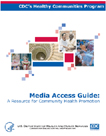Tools for Community Action
On this Page
- The Community Guide
- Community Health Online Resource Center
- Community Health Assessment aNd Group Evaluation (CHANGE) Tool and Action Guide
- Research to Practice: Building Our Understanding
- Action Guides
- Social Media Toolkit
- Physical Activity and Nutrition Strategies and Measurements
- Making the Case for Healthy Living Strategies
- Implementation Guides
The Community Guide
The Guide to Community Preventive Services offers science-based recommendations and findings on strategies and policies that improve health and prevent disease in communities. Find policies, programs or services, funding, research, and education on a wide range of health topics, including obesity, physical activity, and tobacco.
Community Health Online Resource Center
Search or browse through the Community Health Online Resource Center to plan, launch, and evaluate community health programs to prevent chronic diseases. The online resource center includes links to hundreds of useful tools, including:
- Planning guides.
- Evaluation frameworks.
- Communication materials.
- Health risk factors data and statistics.
- Fact sheets.
- Scientific articles.
- Key reports.
- State and local program contacts.
Community Health Assessment aNd Group Evaluation (CHANGE) Tool and Action Guide
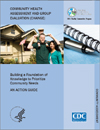
CHANGE is a tool for gathering data. It provides community leaders with a brief look at current local policy, systems, and environmental change strategies and helps to identify areas for improvement. With this data, communities can map out a plan to improve health by creating strategies to make positive, lasting changes in their communities. The Action Guide leads you through using the CHANGE tool.
Research to Practice: Building Our Understanding
This series of reports focuses on health communication and marketing practices to guide communities in making environmental changes to support healthy lifestyles. Reports feature information gathered through expert interviews and research in marketing and communication science in books and articles, the Internet, and consumer databases.
- Cultural Insights – Communication with Hispanic/Latinos [PDF–431KB]
- Key Concepts of Evaluation – Applying Theory in the Evaluation of Communication Campaigns [PDF–236KB]
- Key Concepts of Evaluation – What is it and how do you do it? [PDF–307KB]
- Social Marketing on a Dime – Using Social Media to Do More with Less [PDF–271KB]
Action Guides
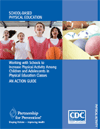
Working with Schools to Increase Physical Activity Among Children and Adolescents in Physical Education Classes [PDF–1.8M]
This action guide, developed by Partnership for Prevention, provides resources and key steps for working with schools to increase physical activity among children and adolescents in physical education classes. It translates a specific recommendation from The Guide to Community Preventive Services into “how to” guidance.
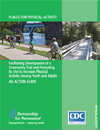
Facilitating Development of a Community Trail and Promoting Its Use to Increase Physical Activity Among Youth and Adults [PDF–2M]
This action guide, developed by Partnership for Prevention, provides resources and key steps to facilitate the development of a community trail and promote its use among youth and adults. It translates a specific recommendation from The Guide to Community Preventive Services into “how to” guidance.
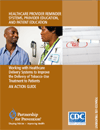
Working with Healthcare Delivery Systems to Improve the Delivery of Tobacco-Use Treatment to Patients [PDF–1.6M]
This action guide, developed by Partnership for Prevention, provides resources and key steps for working with health care delivery systems to improve tobacco-use treatment for patients. It translates a specific recommendation from The Guide to Community Preventive Services into “how to” guidance. Tobacco-use screening and brief intervention is among the top clinical preventive services.
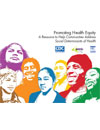
Promoting Health Equity: A Resource to Help Communities Address Social Determinants of Health [PDF–1.5M]
This action guide is for public health practitioners and partners who want to improve health equity in their communities. The guide offers advice from experts in local community leadership, public health, medicine, social work, sociology, psychology, urban planning, community economic development, environmental sciences, and housing.
Media Access Guide: A Resource for Community Health Promotion [PDF–1.5M]
This action guide helps communities to develop effective relationships with the media and gain valuable news coverage for health-related issues. It offers:
- Instructions, tips, and templates for writing press releases, media advisories, and other media-related materials.
- Methods for monitoring media coverage.
- Strategies for placing public service announcements and hosting press conferences.
Social Media Toolkit

CDC’s Social Media Toolkit [PDF–2.42M] will help you get started in social media. It provides guidance on:
- Developing rules and procedures for social media.
- Deciding which channels best meet your communication objectives.
- Create a social media strategy.
Physical Activity and Nutrition Strategies and Measurements
CDC’s MMWR report “Recommended Community Strategies and Measurements to Prevent Obesity in the United States” has 24 recommended strategies for environmental and policy changes to promote healthy eating and active living. A detailed Implementation and Measurement Guide [PDF–2.6M]—developed by CDC’s Division of Nutrition, Physical Activity, and Obesity—helps local governments, states, and policy makers put these obesity prevention strategies in place and report on results. The guide includes measurement data protocols, useful resources, and examples of communities that had success with each strategy.
Making the Case for Healthy Living Strategies
YMCA of the USA’s (Y-USA) Making the Case To Stakeholders: Linking Policy and Environmental Strategies to Health Outcomes is a science-based guide on how certain strategies can lead to specific short-term, mid-term, and long-term outcomes. Y-USA and Stanford University’s Health Improvement Program at the Stanford Prevention Research Center created the guide to show the connection between policy and environmental strategies and long-term health outcomes. Communities can use this guide to help educate stakeholders (including partners and the public) about how healthy-living strategies can improve health outcomes.
Implementation Guides
CDC’s Strategic Alliance for Health communities developed 14 Implementation Guides to help other communities carry out similar proven and promising strategies to reduce the burden of chronic disease. Each Implementation Guide offers key lessons learned and step-by-step guidance for planning, evaluating, and sustaining policy, systems, and environmental change strategies. To learn more, visit the Strategic Alliance for Health page.
